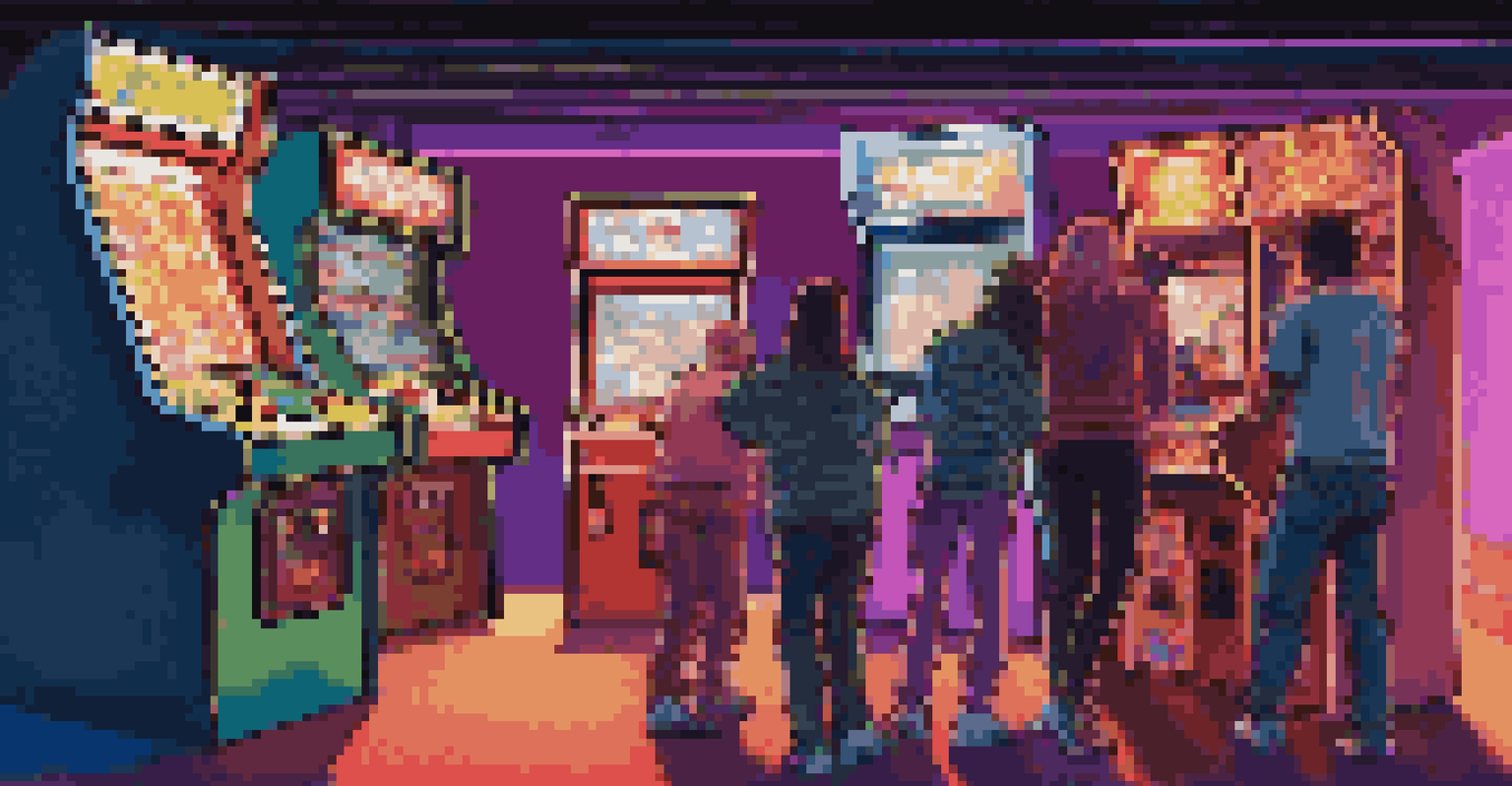The Best Classic Video Games That Defined a Generation

The Rise of 8-Bit Gaming: A New Era Begins
The late 1970s and early 1980s marked the dawn of 8-bit gaming, introducing players to a new realm of digital entertainment. Games like "Pong" and "Space Invaders" captivated audiences with their simple yet addictive mechanics. These titles not only provided entertainment but also laid the groundwork for future innovations in gaming.
Video games are a tremendous form of entertainment, and they can also be art, and they can also be educational. They can also be a way for people to express themselves.
As home consoles became more accessible, titles like the "Atari 2600" brought gaming into living rooms, allowing families to bond over pixelated adventures. This era was characterized by straightforward gameplay, captivating players of all ages, and creating a shared cultural experience. The impact was profound, as it transformed gaming from a niche pastime into a mainstream phenomenon.
With this newfound popularity, developers started to explore more complex narratives and gameplay. This shift paved the way for iconic franchises that would dominate the gaming landscape for decades, influencing the design and storytelling of future games.
The Legend of Zelda: A Quest for Adventure
Released in 1986, "The Legend of Zelda" became a cornerstone of adventure gaming, inviting players into the vast land of Hyrule. It introduced an open-world concept, allowing players to explore and complete quests in a non-linear fashion, which was revolutionary at the time. The blend of action, puzzle-solving, and exploration captivated gamers and set new standards for future titles.

The game’s memorable characters, like Link and Princess Zelda, have become cultural icons, embodying the spirit of heroism and adventure. Each installment in the series builds on the foundation laid by the original, with intricate storylines and evolving gameplay mechanics that resonate with fans old and new. The franchise's enduring legacy is a testament to its impact on the gaming industry.
8-Bit Gaming Transformed Culture
The rise of 8-bit gaming in the late '70s and early '80s shifted gaming from a niche hobby to a mainstream cultural phenomenon, bringing families together through simple yet engaging gameplay.
What truly sets "The Legend of Zelda" apart is its ability to engage players on a deeper level, encouraging them to think critically and explore their surroundings. As players solve puzzles and uncover secrets, they develop a sense of accomplishment that is rewarding and immersive, making it a defining title for generations of gamers.
Super Mario Bros.: Jumping into Legend
"Super Mario Bros.,” released in 1985, revolutionized platform gaming and introduced millions to the world of Mario. With its vibrant graphics, catchy music, and engaging gameplay, it became a cultural phenomenon almost overnight. Players took on the role of Mario, navigating through the Mushroom Kingdom to rescue Princess Peach from the clutches of Bowser, a mission that was both challenging and entertaining.
Games are a part of our culture, and they need to be treated as such. They have the potential to tell stories, create experiences, and even change lives.
The game's design was groundbreaking, as it introduced elements like power-ups and warp zones, allowing for varied gameplay experiences. The simplicity of jumping on enemies and collecting coins created an addictive cycle that kept players coming back for more. Its success not only solidified Nintendo's place in the industry but also established Mario as the face of video gaming.
Today, "Super Mario Bros." is celebrated for its influence on game design and mechanics, inspiring countless sequels and spin-offs. Its legacy continues, as newer generations discover the joy of Mario's adventures, proving that great gameplay transcends time and technology.
Pac-Man: The Maze-Master of Gaming
When "Pac-Man" hit the arcade scene in 1980, it was unlike anything players had experienced before. This maze-chase game had players controlling Pac-Man as he gobbled up pellets while avoiding colorful ghosts. The simple yet challenging gameplay mechanics made it a hit, drawing players into its vibrant world and creating a sense of competition and camaraderie.
The character design of Pac-Man became a cultural icon, symbolizing the golden age of arcade gaming. The game’s appeal transcended demographics, as players of all ages found joy in its addictive gameplay. Its success spawned merchandise, cartoons, and even a hit song, embedding Pac-Man in popular culture.
Classic Games Set Modern Standards
Iconic titles like 'The Legend of Zelda' and 'Super Mario Bros.' established foundational gameplay mechanics and storytelling that continue to influence today's gaming industry.
Pac-Man's legacy continues today, influencing game design and inspiring numerous clones and adaptations. Its blend of strategy, timing, and skill showcases how a simple concept can evolve into an enduring classic that remains beloved by fans around the world.
Tetris: A Puzzle Game for the Ages
"Tetris," created by Russian game designer Alexey Pajitnov in 1984, introduced the world to the addictive nature of puzzle gaming. The objective was simple: fit falling blocks together to create complete lines, clearing them and earning points. Its straightforward gameplay mechanics made it accessible, yet mastering it required skill and strategy, providing endless replayability.
The game’s design is minimalist, showcasing the beauty of simplicity in gaming. As players stack tetrominoes, they experience a rewarding sense of accomplishment that keeps them engaged for hours. The sound of clearing lines became music to players' ears, making it an unforgettable auditory experience.
Tetris has since been adapted for countless platforms and remains a staple in gaming culture. Its impact on the industry is undeniable, paving the way for future puzzle games while demonstrating that sometimes, less really is more.
Final Fantasy: The Dawn of RPGs
Released in 1987, "Final Fantasy" marked the beginning of a beloved franchise that would redefine role-playing games (RPGs). With its intricate storylines, character development, and strategic combat, it drew players into epic narratives filled with adventure and emotion. The game’s success spawned numerous sequels, each building on the rich lore and innovative gameplay mechanics of its predecessor.
What set "Final Fantasy" apart was its deep character development, allowing players to form emotional connections with the heroes and villains alike. The blend of fantasy elements with compelling narratives created a gaming experience that resonated with players on multiple levels. The franchise’s impact on storytelling in games is still felt today, influencing countless titles in the RPG genre.
Legacy of Community and Competition
Classic games fostered a sense of community and competition that paved the way for today's esports and social gaming experiences, highlighting the enduring impact of these early titles.
As technology advanced, so did the series, introducing stunning visuals and complex battle systems. Yet, the heart of "Final Fantasy" remains its ability to transport players to fantastical worlds where they can escape reality while forging unforgettable adventures.
Street Fighter II: The Birth of Competitive Gaming
"Street Fighter II," released in 1991, took the fighting game genre to new heights and created a competitive gaming culture. With its diverse roster of characters, each with unique abilities and fighting styles, players found themselves immersed in fast-paced battles. The game’s mechanics encouraged skillful combos and strategies, making it a favorite in arcades and among friends.
The introduction of multiplayer mode allowed players to challenge each other, sparking friendly rivalries and community building. This competitive aspect laid the groundwork for future esports and tournaments, establishing a new way for gamers to connect and showcase their skills. The iconic moves and catchphrases of characters like Ryu and Ken became embedded in gaming culture.

"Street Fighter II" not only revolutionized fighting games but also influenced game design, prompting developers to create more intricate fighting mechanics. Its legacy continues through sequels and adaptations, proving that the thrill of competition in gaming is timeless.
The Impact of Classic Games on Today's Industry
The classic video games we've explored did more than entertain; they shaped the gaming industry into what it is today. Their innovative mechanics, storytelling, and cultural impact set the standard for modern games, influencing everything from design to narrative depth. As we look back, it’s clear that these titles laid the groundwork for the diverse gaming landscape we enjoy now.
Many today may not realize how these classics continue to inspire game developers. Elements from these titles can be seen in contemporary games, whether in gameplay mechanics, character design, or narrative styles. Understanding the roots of gaming offers valuable insights into how the industry has evolved and where it may head in the future.
Ultimately, these classic games created a sense of community and shared experience that remains central to gaming culture. As new technologies emerge and gaming continues to evolve, the essence of what made these games special will always be a part of the conversation, reminding us of the joy they brought to countless players.